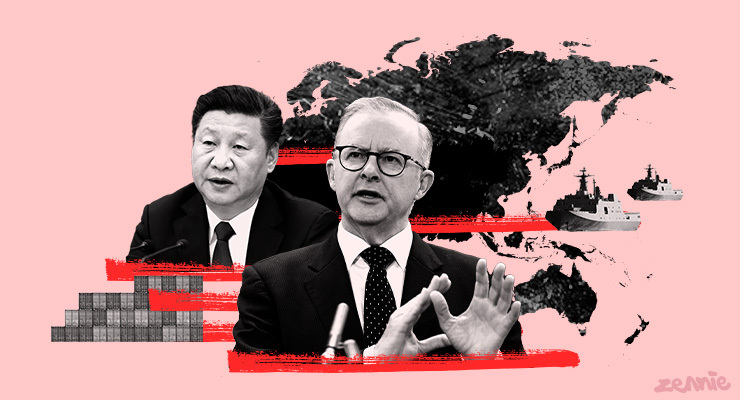
No one expects much in the way of concrete outcomes from the prime minister’s meeting with Chinese ruler Xi Jinping at the G20 — least of all the government.
But it confirms that, after two meetings between Penny Wong and Chinese Foreign Minister Wang Yi and Anthony Albanese’s meeting with premier Li Keqiang in Phnom Penh, there’s now a trail of baby steps towards less overtly hostile relations between Australia and China.
That’s all been achieved without any noteworthy shift in Australia’s position on any significant issue of vexation to the Chinese regime. Only on Sunday, Wong, giving the Whitlam Oration in Blacktown in Sydney, said about Australia’s differences with China “as China has sought to assert itself in the world, those differences have become harder to manage”.
“The China of today is not the same as the China of the 1970s, or even the 2000s,” the foreign affairs minister said. “Some may prefer to pretend otherwise, but President Xi himself has made that clear … I have made it plain that we will speak out as necessary on the issues that matter to Australians, including human rights and upholding the international rules to which we have all agreed.”
Wong used words like “calm”, “consistent” and a term she has used repeatedly about the relationship with China — “stabilise”.
There was little in the way of stability in Australia’s relationship with China under the Coalition. Only Malcolm Turnbull exhibited a rational and adult approach to Beijing. Under Tony Abbott — with the simpering support of the Murdoch media — the Coalition embraced Xi, announced a trade deal with China that turned out to be worthless, and invited the dictator to soil the Parliament with his presence. Under Morrison, with a 1984-style reversal, China became the great enemy, with incessant talk of military conflict.
What Albanese and Wong have offered since the change of government is no change of key policy points, but far more calm and far more stability. The Chinese regime at least understands there are adults in the room again in Canberra, and there’ll be stability in Australia’s position regarding China for the time being.
The Albanese-Xi meeting is thus one more small step towards a civil relationship, or as civil as one can have with a regime that rejects the rule of law and basic rights.
It’s unlikely China’s trade sanctions — which have probably done China more damage than Australia — will be lifted any time soon. But Albanese could expedite that by offering an olive branch: ending Australia’s pernicious and economically harmful anti-dumping regime, or at least significantly curbing the ability of lazy, inefficient Australian firms to use it to prevent the import of cheaper Chinese products.
Indeed, at a time when the Australian construction industry is feeling the pain of record high prices from lack of supply, it’s ridiculous that we continue to punish ourselves by slapping tariffs on cheaper building supplies like Chinese steel.
One of the key points in Wong’s speech was her forensic analysis of the way the Coalition has always — from Billy McMahon on — tried to use the relationship with China for domestic political purposes.
McMahon tried to smear Gough Whitlam for pursuing closer relations with China — only for it to backfire on him spectacularly when the Americans were revealed to be doing the same; Abbott tried to smear Labor as racist for querying his free trade agreement with Xi, and Scott Morrison and Peter Dutton tried to paint Labor as in league with China and Beijing’s preferred winner of the 2022 election.
“We will not be trying to make media headlines out of the China relationship,” Wong said. “We won’t weaponise national security for political purposes.”
History shows that only applies to one side of politics in Australia.








Albanese, Wong and Labor have not only offered “calm and stability” towards managing our relationship with China but they have offered the same to Australia. The adults are definitely back in charge…thank goodness.
Is that helpful? I’m not just asking about the adolescent language so much as the isolationist sentiment.
I’d rather most foreign leaders visit Australia more often. With intelligent media coverage, our relationships could evolve into something more sophisticated and useful.
Maybe the language was over the top, but so was inviting Xi to address our parliament. It’s more than just visiting the country.
Yet we invite Brandon to address our Parliament.
Nothing the Coalition has ever down has been other than trying to further their bid for or grip on power. Labor seems to be doing stuff that will enhance Australia’s standing in and benefits from/to in the world. A rather large contrast.
Given Xi has just secured a controversial reappointment we might now see some lowering of tensions on the Chinese side. Chinese leaders might not face popular elections but they are still subject to political pressures in their fight to get to the top, and warmongering is as true a method for building a constituency for Xi as it was for Bush and Howard.
The LNP appear to be nothing more than over priveleged dunderheads who try to make up for their lack of ability by breaking the law. I think people are waking up to them.